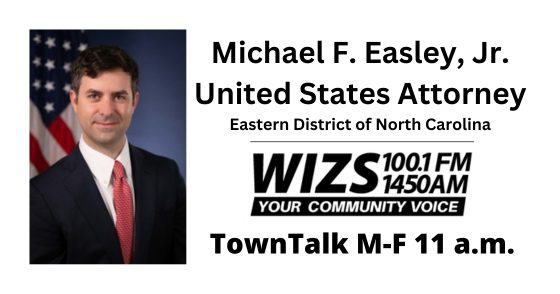North Carolinians can take pride in knowing that this state we call home is a destination for many tourists each year. The interstate highway network helps folks travel easily from Manteo to Murphy, Henderson to Charlotte and just from about anywhere to Raleigh with minimal effort.
Those very things that make the Old North State an attractive spot for visitors, however, also get the attention of some other individuals: human traffickers, whom U.S. Attorney for the Eastern District of North Carolina Michael F. Easley, Jr. called one of the biggest threats and most insidious to our society.
January is Human Trafficking Awareness Month and Easley spoke with WIZS on Thursday’s TownTalk to discuss just what the state is doing to fight the problem.
Easley created a task force to combat human trafficking in the Raleigh/Cary area, and earlier this week announced that a second task force has been formed to work with counties to the East near the coast.
These task forces bring together local law enforcement agencies with state and federal agencies to create a strong one-two punch to catch and prosecute people who engage in human trafficking and prostitution.
“We have taken a victim-centric approach,” Easley said. “We’ll hit it with law enforcement,” Easley said of uncovering illegal operations, “but we’ll also have social workers, service providers and mental health professionals” on hand to assist those who have been victimized.
He praised the efforts of the FBI for their work in disrupting these trafficking networks and said the agency has “an incredible victim support system to help (victims) get their lives back on track and stabilized.”
He also praised the efforts of local law enforcement agencies, calling Henderson Police Chief Marcus Barrow and Vance County Sheriff Curtis Brame “reliable partners” who are both in his speed dial.
And he called District Attorney Mike Waters “one of the most forward-leaning prosecutors” he knows. “He’s an incredible partner and somebody I count on to help unravel these cases.”
Traffickers are masters of manipulation, he said, and they prey on the most vulnerable in society – often, these are young people.
They seize control, little by little, he explained, and bring their victims under their full control.
“They control their victims, but they’re not bound in chains,” Easley said. “The chains are invisible.”
Some signs to look for include individuals who are not in control of their own documents, like a passport or driver license. They aren’t allowed to speak for themselves, or they often wear the same clothes day after day and only carry cash.
These are all those “invisible chains that bind a victim to a trafficker,” Easley said.
Perhaps most chilling was Easley’s comment about protecting young people from becoming victims of human traffickers: “Any kid who has a smartphone is a target,” he said. “There are groomers online who are trying to cleave them away” from parents and their community.
It may start with the victim agreeing to send one nude photo to an online groomer, he said, before that trafficker has the leverage needed to target another victim.
“We will break down and eliminate this insidious crime,” he said. “We can’t do it alone; we’ve go to do it side by side with local police and law enforcement.”
If you or anyone you know needs help or has information to provide regarding a potential human trafficking situation, please contact law enforcement by calling 911 if the situation appears unsafe, or contact the National Human Trafficking Hotline:
- humantraffickinghotline.org/
- 1-888-373-7888
- *Text 233733
- Email: help@humantraffickinghotline.org
CLICK PLAY!
